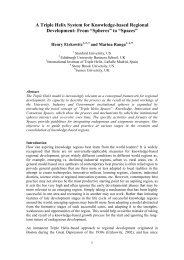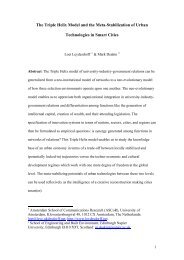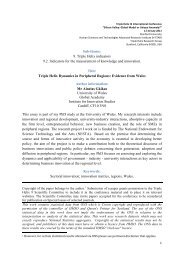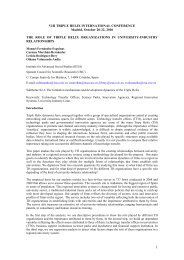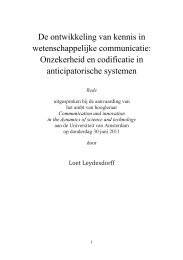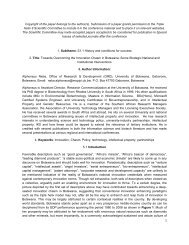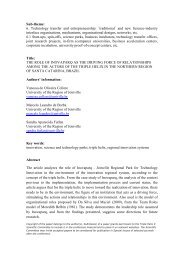TRIPLE HELIX noms.pmd
TRIPLE HELIX noms.pmd
TRIPLE HELIX noms.pmd
Create successful ePaper yourself
Turn your PDF publications into a flip-book with our unique Google optimized e-Paper software.
O-073Knowledge Transfer Offices in Portuguese Universities: Institutional Changeand Construction of New Actor-NetworksHugo Pinto, Tiago Santos Pereira, Centre For Social Studies, University of Coimbra, PortugalExtended AbstractThe Triple Helix (Etzkowitz and Leydesdorff, 1997) underlines the new role of the university within the knowledge economy asan entrepreneurial organization (Etzkowitz et al. 2000). A new stream of activities linked with knowledge transfer (KT) pointdirectly to the promotion of territorial development (Rodrigues, 2008; Gunasekara, 2006). A broad notion of KT includes both thescience commercialization activities and others related with the civic role of university. As a central topic for S&T policy, KTgained relevance with the introduction of the Bayh-Dole Act in the United States. Berman (2008) stressed the usefulness of thisact in the 80's as a process of institutionalization of a number of practices underlining the importance of transfer activities (inparticular, the economic benefits resulting from patents of publicly funded research), creating new incentives and changingpractices and routines. In Europe, KT became a central issue with the recognition of a European paradox, regarding theEurope's good performance in scientific research and the less good in innovation.The transfer happens in an interface area where the worlds of science, industry and government overlap. Different types ofbodies have emerged, acting as intermediaries. Howells (2006) suggests the systemic value of intermediaries, not only improvingthe connectedness within a system, but particularly, in the creation of ties and as system animator. The Knowledge transferoffices (KTO) are one of these new intermediaries that can be seen as boundary organizations, mediators internalizing thecontingent nature of the scientific reality in their everyday practice, creating border objects for the collaboration betweendifferent worlds (Guston, 1999).The article, framed under the Actor-Network Theory (Latour, 2005), tries to understand KT by tracing the associations that eachKTO needs to do succeed. This approach underlines the concept of translation showing how actors constantly engage in aprocess to translate their languages, their problems, their identities and their interests into the others. These notions have someaffinities with institutional analysis by bringing attention to the process of change through temporary stabilizations (Berman,2008) and facilitating the analysis of the process of institutional change itself (Streeck and Thelen, 2009).Portugal is commonly seen as a European Union member-state in a less favourable situation regarding innovation. The limitationsof innovative performance are confirmed by several studies at national and regional scale. Portuguese universities were confrontedwith this new (international) paradigm of the enlarged role of the universities. The changes were strongly felt with the emergenceof new pressures, incentives and schemes to engage researchers and firms in these activities, the design of new legal frameworks,with the simplification of industrial property codes and creation of reference guides to spinning-out processes, or the emergenceof new actors such as the KTOs.The analysis focuses three Portuguese universities: Coimbra, Algarve and Aveiro. The choice of these universities is justified byits central role in terms of regional development. The three universities are outside of the two most relevant metropolitan areasin Portugal (Lisbon and Porto) and had a significant impact in the qualification of the human resources and local dynamics.However the cases are somewhat different in terms of critical mass, history and linkages with industry which has createddifferent configurations. Personal interviews to KT officers and the collection of secondary information facilitated the systematizationand comparison of the mission, the motives and moment for the creation, the organizational structure and crucial results of thethree KTOs.The Instituto Pedro Nunes (IPN), created in 1991, a pioneer initiative in Portugal at the time by initiative of the University ofCoimbra, is a non-profit private organization that seeks to promote a culture of innovation, quality, accuracy and entrepreneurship.The Algarve's Regional Innovation Centre (CRIA), a more recent initiative of 2003, was mainly a regional policy-push projectbenefiting from European funds financing. This interface entity was established within the University of the Algarve to promoterelations between universities and enterprises, support the establishment of new firms, the use of industrial property mechanismsand to develop, outside the university, technological agglomeration areas in the region. The UATEC - Unit of Technology Transferis the mediator of knowledge transfer at the University of Aveiro. The unit, focusing the acquisition, administration, negotiation,assessment and evaluation of technologies, the protection of intellectual property and its commercialization, has a peculiarcharacteristic of an intensive demand-side effort that stimulates the linkages in university-industry relations.The results underline the considerable heterogeneity of approaches to answer the new challenges that universities in Portugalface. Despite the specific features of each KTO, these organisms commonly evidenced a crucial impact for the knowledgetransfer network creation, assuming themselves to be the translation enablers in a relevant proportion of the processes in theirregional intervention area.Key-words:University, Knowledge Transfer, KTO, Institutional Change, Actor-Network-TheoryMadrid, October 20, 21 & 22 - 2010260



